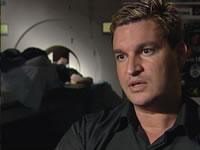Neural correlates of a mystical experience in Carmelite nuns
 Mario Beauregard has fMRI’d nuns having semi-mystical states and found that a whole range of brain regions (including the right medial orbitofrontal cortex, right middle temporal cortex, right inferior and superior parietal lobules, right caudate, left medial prefrontal cortex, left anterior cingulate cortex, left inferior parietal lobule, left insula, left caudate, left brainstem, and extra-striate visual cortex), demonstrating that mystical experience (or at least the memories of mystical experience these Christian nuns called forth) were involved, thus supposedly disprovnig the “God spot” theory.
Mario Beauregard has fMRI’d nuns having semi-mystical states and found that a whole range of brain regions (including the right medial orbitofrontal cortex, right middle temporal cortex, right inferior and superior parietal lobules, right caudate, left medial prefrontal cortex, left anterior cingulate cortex, left inferior parietal lobule, left insula, left caudate, left brainstem, and extra-striate visual cortex), demonstrating that mystical experience (or at least the memories of mystical experience these Christian nuns called forth) were involved, thus supposedly disprovnig the “God spot” theory.
Beauregard’s article in Science Direct uses the term “spiritual neuroscience,” which I had never heard before. We’re all eager for good new terms to replace “neurotheology,” but I don’t think this suggestion will fly. It evokes images of scientists in white coats having spiritual experiences as they do their neuroscience research.
I guess political correctness is catching on in the neurotheology biz. Here’s Beauregard’s disclaimer from the article:
With respect to this issue, it is of paramount importance to fully appreciate that elucidating the neural substrates of these experiences does not diminish or depreciate their meaning and value, and that the external reality of “God” can neither be confirmed nor disconfirmed by delineating the neural correlates of RSMEs.
Beauregard also uses the term RSME, for “religious/spiritual/mystical experience”. Is this well-known terminology, or something he invented? It seems useful.
The research was supported by Metanexus , an organization which “advances research, education and outreach on the constructive engagement of science and religion.”
WebMD provides a brief overview of the research.

August 31st, 2006 at 22:58
I find the term “spiritual neuroscience” a bit of a mouthful. Mind you, I’m not that keen on the word “neurotheology”, either. To me it sounds like the researcher is seeking a “god”.
As we’ve seen so often, people tend to find the sort of thing they are seeking, even if they have to use a bit of imagination. If the truth turns out to be something utterly different, though, they’ll miss it because of their preconceptions.
Actually, I find that the words “spiritual” and “god” have become so nebulous these days that they’re nearly useless. For this reason, I’ve been referring to my own path as “reality study”. The term is neither inspiring nor memorable, but it doesn’t have too many unwanted connotations.
December 8th, 2006 at 18:41
An overview of all the brain scan research on spiritual experiences subtantially disproves the notion of a god spot or module in the brain. Instead, each form of religious practice stimulates different neural centers in different ways. In Newberg’s studies at the Univ. of Penn, nuns and Buddhists were similar, but speaking in tongues evokes almost the opposite response. Short term meditation leaves a different neural imprint than long term (45 minutes or more) practices. However, Newberg did find, in all his studies, that medititors (including an atheist) had asymmetric activity in the thalamus. This is very unusual and offers the first data that spiritual practices can permanently change the sensory organization circuits in the brain. See his book, WHY WE BELIEVE WHAT WE BELIEVE, which reports all of these findings.
April 14th, 2008 at 18:17
I believe an “experience of beauty” can be a prelude to a true mystical experience.
I would be pleased to discuss this idea with anyone that may be interested